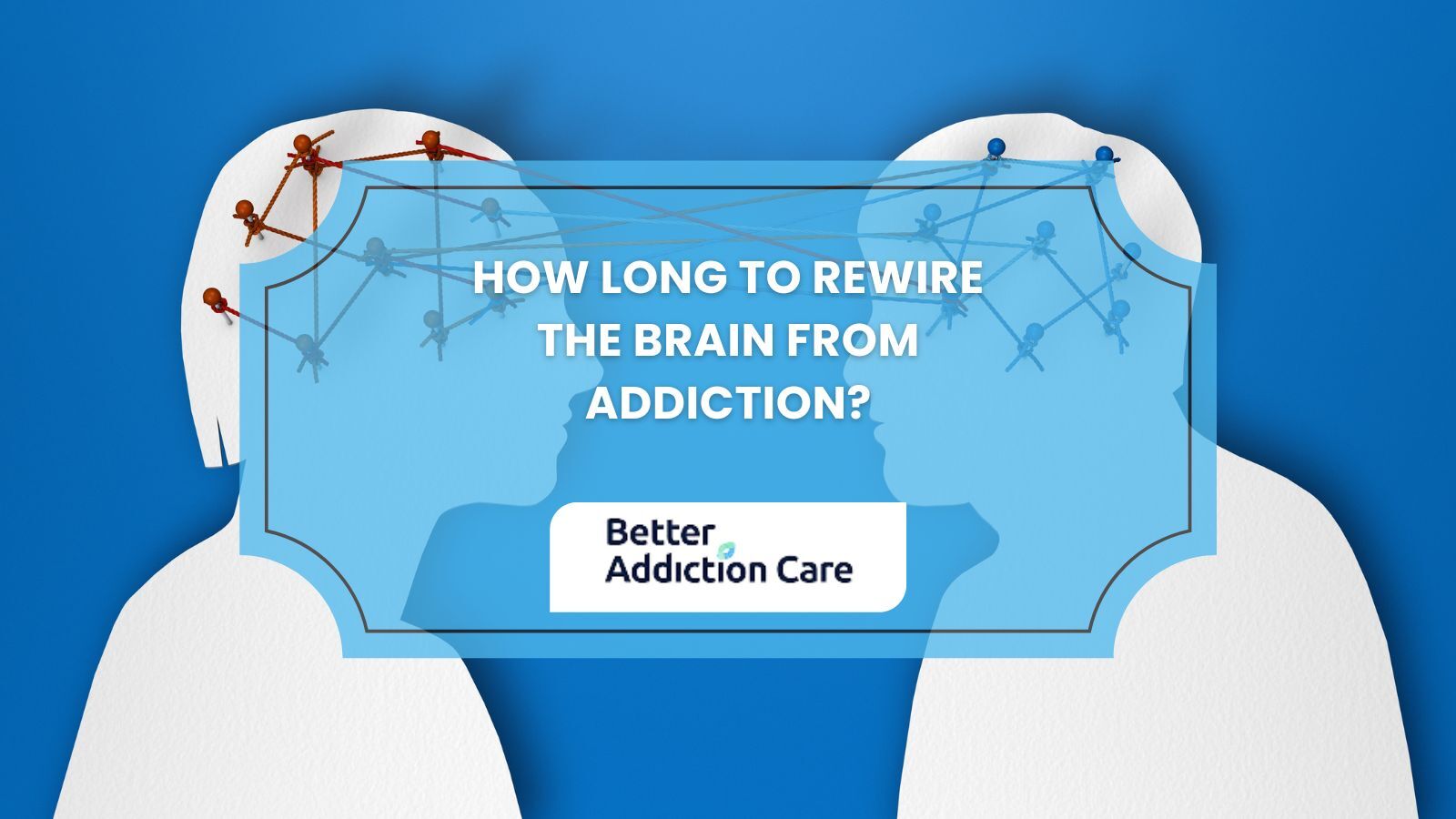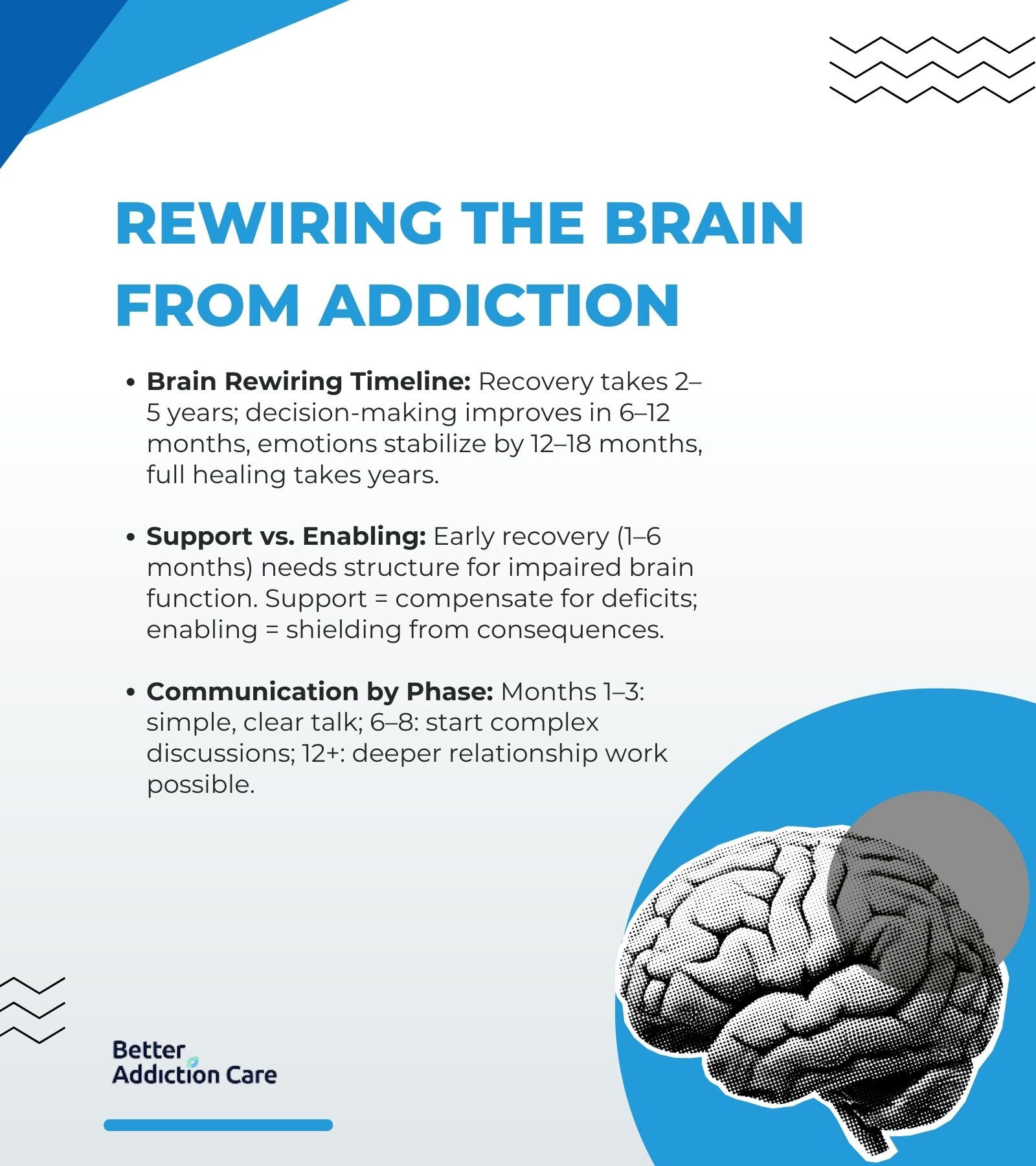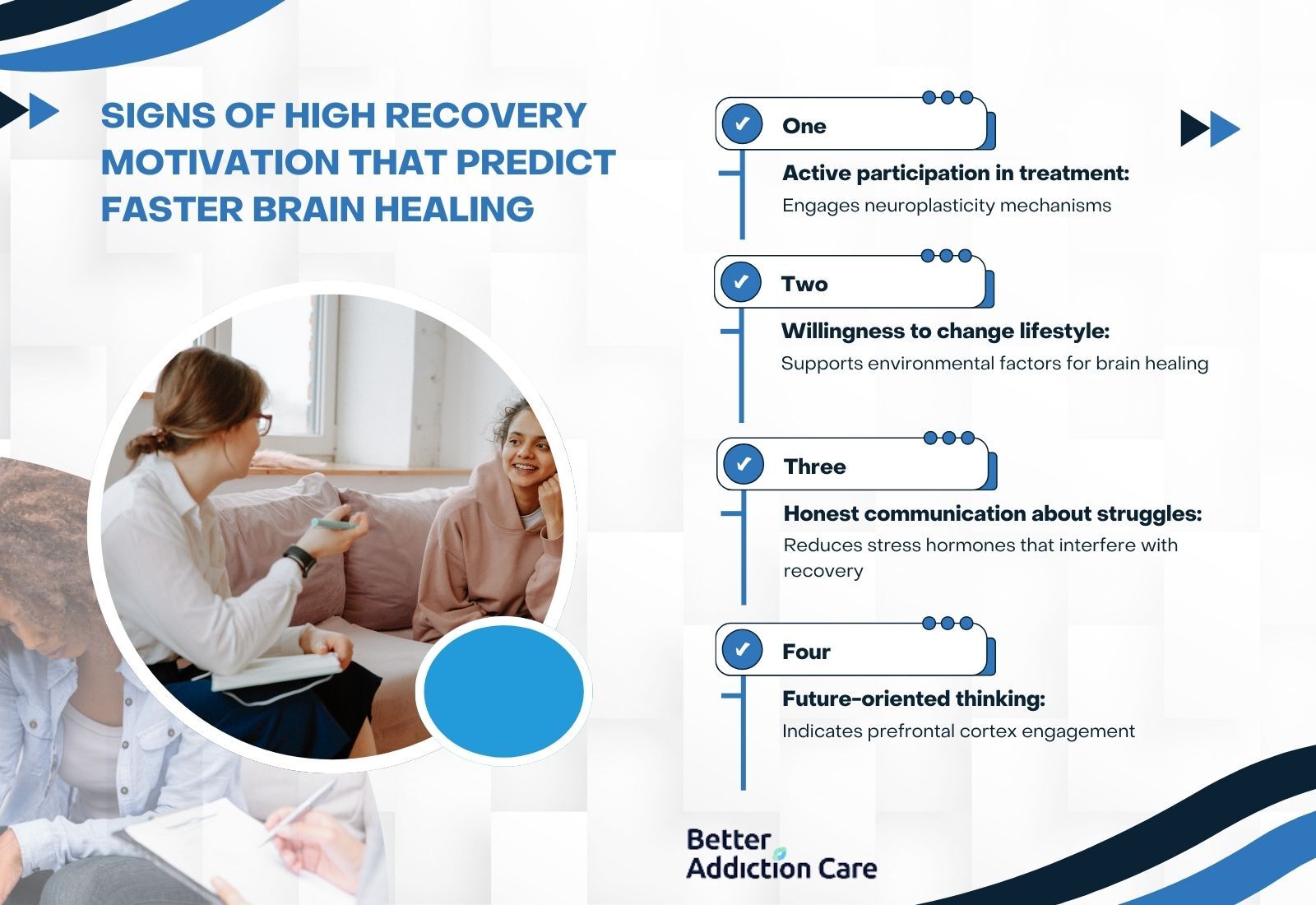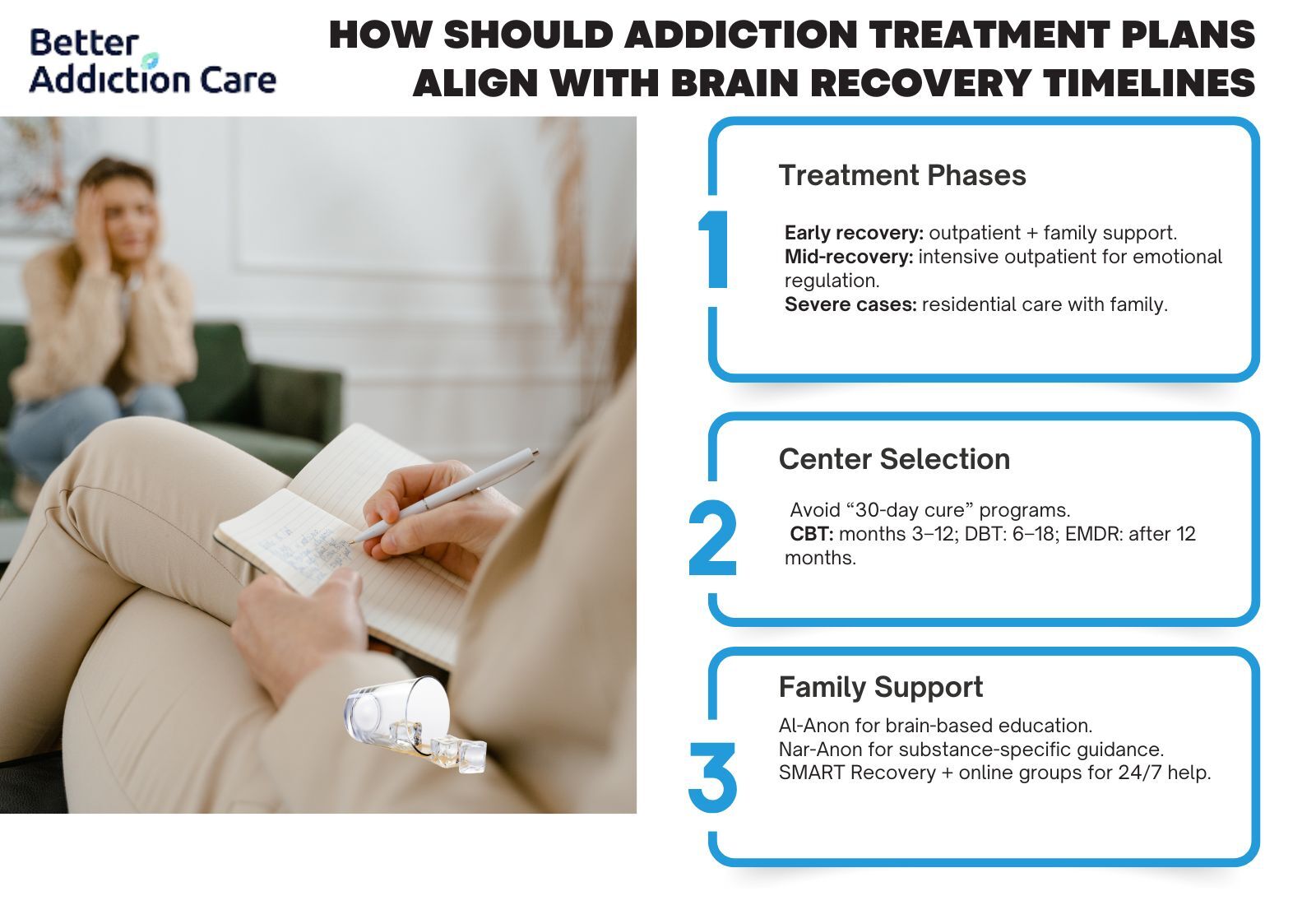How Long to Rewire the Brain from Addiction?
Recovering the brain from addiction takes from 6 months to a few years, depending on factors like the substance used, duration of addiction, individual health, and consistency of recovery effort. 2-5 years for complete brain rewiring, with critical changes happening at predictable intervals.

The prefrontal cortex (decision-making) takes 6-12 months to significantly improve. The limbic system (emotional regulation) stabilizes around 12-18 months. Deep neural pathway reconstruction continues for years.
This isn't just medical information, it's hope with a timeline. A deeper understanding of these stages helps families create realistic expectations, communicate effectively during each recovery phase, and rebuild trust without enabling destructive behaviors.
Below are 2 conversations asking the same question from opposite sides of recovery: How long does it take for the brain to heal from addiction?
2:47 AM - A mother stares at her phone, debating whether to call her son. Four months clean, but she can't shake the familiar dread. "How long until I can trust this is real?"
2:52 AM - Her son lies awake, frustrated after snapping at his daughter over homework. He'd promised himself he'd be patient. "Why can't I just be normal?
Key Takeaways:
-
Brain rewiring takes 2-5 years with predictable phases: The prefrontal cortex (decision-making) improves in 6-12 months, emotional regulation stabilizes around 12-18 months, and complete neural reconstruction continues for years. Understanding these specific timelines helps families set realistic expectations and avoid the disappointment that comes from expecting too much too soon.
-
Supporting brain healing looks different than enabling addiction: During early recovery (months 1-6), providing structure like driving to appointments and helping with organization compensates for temporarily impaired brain function. You're enabling when you prevent natural consequences of choices, but you're supporting when you compensate for measurable neurological limitations that will improve over time.
-
Communication strategies must match brain recovery phases: Simple, concrete conversations work best during months 1-3 when the prefrontal cortex is severely compromised. Complex emotional processing becomes possible around months 6-8, and deeper relationship healing can begin after 12+ months when significant brain rewiring has occurred.
What is the Brain Rewiring Timeline for addiction?

The brain rewiring timeline for addiction spans from 2 weeks to 5+ years, progressing through stages of withdrawal, early recovery, sustained healing, and long-term neuroplastic adaptation
Days 1-30 - Stabilization Phase
During the first month, the brain is primarily focused on achieving chemical balance.
Neurotransmitter production begins to normalize, but this process creates significant mood swings, anxiety, and cognitive fog.
From a family perspective, this means the person you're talking to may seem emotionally unpredictable or have difficulty following conversations.
Key insight for families: If your loved one seems "different" or struggles with basic tasks during this period, it's not a lack of motivation; their brain is rebuilding its chemical foundation.
Days 30-90 - Early Neuroplasticity
This is when the brain begins forming new neural pathways more actively. Sleep patterns start improving, and some cognitive functions return.
However, the prefrontal cortex (responsible for decision-making and impulse control) is still significantly compromised.
Trust-building reality: This is often when families see improvement and assume "they're better now," leading to disappointment when setbacks occur. The brain is healing, but it's nowhere near fully rewired.
Months 3-12 - Substantial Rewiring
During this period, new neural pathways become stronger, and the brain's stress response begins normalizing.
However, this is also when many people experience what researchers call "post-acute withdrawal syndrome", waves of depression, anxiety, and cravings that can last days or weeks.
Communication breakthrough: Around month 6-8, many families notice their loved one becomes more emotionally available and capable of deeper conversations. This isn't coincidental; it's when the prefrontal cortex regains enough function to support complex emotional processing.
Years 1-2 - Strengthening New Patterns
The new neural pathways become more established, but they're still vulnerable to stress.
During this period, the person's personality often becomes more stable, and their ability to handle conflict and stress improves dramatically.
Years 2-5 - Long-term Stabilization
Brain scans show that it can take 2-5 years for the brain to fully rewire from addiction, with some studies suggesting that certain changes may be permanent.
However, this doesn't mean recovery isn't possible; it means the brain learns to work effectively with these changes.
What Are Factors That Affect The Time the Brain Takes to Return to Normal After Addiction?
Factors affecting the time taken for the brain to return back to normal after drug abuse, including the type and duration of substance use, individual brain chemistry, age, genetics, mental health conditions, and the presence of supportive therapies and lifestyle changes like exercise, nutrition, and social connection
While the 2-5 year timeline provides a general framework, several factors influence how quickly someone's brain will heal and how long families will need to maintain heightened support.
Understanding these variables helps families set realistic expectations and avoid the frustration of comparing their journey to others.
1. Age at First Use: The Developing Brain Factor
The Surgeon General’s Report on Addiction[1] highlights the impact of drug addiction on different body parts, including the brain.
If someone starts drinking at 16, while their brain is still developing. The prefrontal cortex doesn't fully mature until age 25, making adolescent brains particularly vulnerable to addiction's rewiring effects.
Research published in PubMed Central shows that people who begin substance use before age 18 typically require 6-12 months longer for complete brain rewiring compared to those who start in their twenties.
Why does this matter for families? If your loved one started using substances as a teenager, patience during the extended recovery timeline isn't just helpful, it's neurologically necessary. Their brain is essentially healing from two processes: addiction damage and completing normal development.
2. Duration and Intensity of Use: The Accumulated Damage Principle
A three-year addiction creates more extensive neural pathway damage than a six-month habit. Each month of heavy use compounds the brain's structural changes, particularly in the prefrontal cortex and basal ganglia.
A 2023 research study published in the Substance Abuse Journal confirmed that longer duration of substance abuse correlates with extended recovery timelines.
Each month of heavy use compounds the brain's structural changes, particularly in the prefrontal cortex and basal ganglia.
The intensity factor: Daily use creates deeper neural grooves than weekend use. Binge patterns cause different damage than steady consumption.
Heavy weekend binging creates intense stress on the extended amygdala, potentially extending the emotional regulation recovery phase by 3-6 months.
3. Substance Type: Different Drugs, Different Recovery Timelines
Not all substances affect the brain equally. Each drug creates unique patterns of damage and healing:
Alcohol: Primarily affects the prefrontal cortex and limbic system. Brain volume can begin recovering within 6-8 months, but emotional regulation may take 12-18 months to stabilize.
Opioids: They heavily impact the brainstem and extended amygdala. Physical dependence resolves in weeks, but the emotional and motivational systems may take 18-24 months to normalize.
Stimulants (cocaine, methamphetamine): Cause severe damage to the dopamine reward system in the basal ganglia. Recovery often requires 2-3 years for the brain to develop alternative reward pathways.
Multiple substances: Polysubstance use creates complex, overlapping damage patterns that can extend recovery timelines by 6-12 months beyond single-substance addiction.
4. Mental Health Conditions: The Dual Healing Challenge
Your loved one might also struggle with anxiety, which both contributes to their addiction and complicates their recovery.
When the brain is healing from addiction while managing underlying mental health conditions, the recovery process takes longer.
Common co-occurring conditions and their impact:
-
Depression: Extends emotional regulation recovery by 6-9 months
-
Anxiety disorders: Delays stress response normalization by 3-6 months
-
ADHD: May slow prefrontal cortex healing by 4-8 months
-
Trauma/PTSD: Can extend overall recovery timeline by 12-18 months
5. Physical Health: The Foundation for Brain Healing
Poor overall health during addiction, malnourished, sleep deprivation, and physical weakness significantly impact recovery.
The brain requires optimal physical conditions to rebuild neural pathways effectively.
Health factors that accelerate brain rewiring:
-
Adequate sleep: 7-9 hours nightly supports neuroplasticity
-
Proper nutrition: B vitamins, omega-3s, and protein fuel brain repair
-
Regular exercise: Increases BDNF (brain-derived neurotrophic factor) by up to 200%
-
Hydration: Dehydration can slow neural recovery by 15-20%
6. Genetics: The Individual Blueprint
Family history affects both addiction vulnerability and recovery speed.
If someone in the family struggles with alcohol, it suggests the role of genetic factors in play that may influence their brain's healing capacity.
Genetic factors that affect recovery timeline:
-
Dopamine receptor variants: Can extend basal ganglia recovery by 6-12 months
-
Serotonin transporter genes: May affect emotional regulation and recovery speed
-
COMT gene variants: Influence prefrontal cortex healing efficiency
-
Family addiction history: Often correlates with 10-15% longer recovery times
7. Support System Quality: The Environmental Accelerator
Educated family support significantly impacts brain healing speed.
Strong family support can accelerate recovery by 20-30% while toxic or enabling environments can extend timelines by 6-12 months.
Support factors that speed brain rewiring:
-
Consistent family involvement: Provides external structure for healing the prefrontal cortex
-
Professional treatment: Evidence-based therapy accelerates neural pathway development
-
Peer support groups: Social connection supports limbic system healing
-
Stable housing and finances: Reduces stress hormones that interfere with brain repair
8. Stress Levels: The Recovery Accelerator or Brake
Chronic stress floods the brain with cortisol, which directly interferes with neuroplasticity.
High-stress environments can extend the impact generated on the brain significantly, while low-stress recovery settings can accelerate healing.
Stress sources that slow brain healing:
-
Relationship conflicts: Particularly damaging during emotional regulation recovery
-
Financial pressure: Keeps the extended amygdala in a hyperactive state
-
Work instability: Prevents the prefrontal cortex from focusing on healing
-
Legal issues: Chronic stress hormones interfere with neural repair
9. Previous Recovery Attempts: The Accumulated Wisdom Factor
The previous recovery attempts may reduce the time to heal the brain fully.
Each recovery period allows some neural healing to occur, creating a foundation for more successful subsequent attempts.
The "kindling effect" in reverse: Just as repeated relapses can worsen addiction, repeated recovery attempts can build resilience and healing capacity.
Many families report that their loved one's brain seemed to "remember" healthy patterns from previous recovery periods.
10. Motivation and Readiness:
Your loved one’s motivation level directly affects how actively their brain engages in rewiring.
High motivation activates the prefrontal cortex and limbic system in ways that support healing, while reluctant recovery can slow the process.
Signs of high recovery motivation that predict faster brain healing:

-
Active participation in treatment: Engages neuroplasticity mechanisms
-
Willingness to change lifestyle: Supports environmental factors for brain healing
-
Honest communication about struggles: Reduces stress hormones that interfere with recovery
-
Future-oriented thinking: Indicates prefrontal cortex engagement
When to Seek Professional Help?
It’s advisable to seek professional addiction help immediately when brain rewiring shows signs of complications. Red flags include severe depression, persistent insomnia after 30 days clean, suicidal thoughts, or inability to handle basic relationships.
Mid-recovery concerns include ongoing emotional volatility, stress intolerance, and cognitive issues interfering with daily life. Late-recovery warnings include regression in function, persistent relationship problems, or new addictive behaviors.
How should addiction treatment plans align with brain recovery timelines?

Addiction treatment plans should align with brain recovery timelines by matching therapy intensity and type to each phase of neurological healing, starting with supportive outpatient care during early recovery (months 1–6), progressing to emotion-focused therapies like DBT in mid-recovery (months 6–18), and incorporating trauma-informed approaches like EMDR after 12+ months, while ensuring family involvement and avoiding programs that promise rapid results inconsistent with how the brain rewires.
-
Treatment options should match brain healing phases.
-
Early recovery (months 1-6) benefits from outpatient treatment with daily family support.
-
Mid-recovery (months 6-18) works well with intensive outpatient programs focusing on emotional regulation.
-
Severe cases may require residential treatment with family participation.
-
Choose treatment centers that understand brain rewiring timelines.
-
Avoid programs promising "complete healing" in 30-90 days or those ignoring neurological recovery.
-
Effective centers provide brain-appropriate therapy timing: CBT works best in months 3-12, DBT during months 6-18, and EMDR after 12+ months.
-
Family support groups provide crucial education and connection.
-
Al-Anon offers addiction-as-brain-disease education, while Nar-Anon addresses substance-specific brain changes.
-
SMART Recovery provides evidence-based tools, and online communities offer 24/7 support during crisis moments when brain rewiring creates instability.
Frequently Asked Questions
How long does it take for the brain to heal from addiction?
Complete brain rewiring takes 2-5 years, but significant improvements happen at predictable intervals. Decision-making improves in 6-12 months, emotional regulation stabilizes around 12-18 months, and deep neural reconstruction continues for years. The timeline varies based on substance type, duration of use, and individual factors.
Can you see brain changes on medical scans?
Yes, brain imaging shows measurable changes throughout recovery. Early scans reveal reduced prefrontal cortex activity and altered dopamine function. Follow-up scans at 6, 12, and 18 months show progressive improvement in brain structure and function, providing concrete evidence of healing.
Why does my loved one seem "different" even after months of sobriety?
The brain rewires during recovery, often creating positive changes in personality, emotional awareness, and relationships. Many families report their loved one becomes more emotionally intelligent, grateful, and intentional about relationships than before addiction.
What if there's a relapse during while the brain is still healing?
Relapse during brain rewiring is often a sign that stress overwhelmed developing neural pathways, not a moral failure. The key is responding with increased support and structure rather than punishment, and understanding that interrupted healing can be restarted.
Do some people's brains never fully recover?
While some structural changes may be permanent, the brain's neuroplasticity allows it to develop new pathways and adapt effectively. Many people report their post-recovery brain function is better than before addiction, with enhanced emotional intelligence and stress resilience.
What's the difference between brain rewiring and just getting used to not using substances?
Brain rewiring involves actual structural and functional changes in neural pathways, not just behavioral adaptation. New neural connections form, damaged areas heal, and the brain develops new ways of processing stress, emotions, and decisions, changes visible on brain scans.
Are there medications that help with rewiring of the brain?
Yes, certain medications can support neuroplasticity and brain healing during recovery. However, these are most effective when combined with therapy, family support, and lifestyle changes. Medical supervision is essential for medication-assisted brain rewiring.
What happens to the brain after 5 years of recovery?
After 5 years, most brain rewiring is complete, but the brain continues to strengthen healthy patterns and can continue improving. Many people report continued growth in emotional intelligence, stress management, and relationship skills years into recovery.
Conclusion: The Journey of Neuroplasticity and Hope
Thousands of families navigate the complex journey of brain returning to normal after addiction. Six months after initial recovery, many discover that relationships transform in unexpected ways.
As one mother shared: "Recovery isn't about getting the old person back, it's about building a relationship with who they're becoming. Their brain is different now, and in many ways, that's been a gift. They're more emotionally aware, grateful, and intentional about relationships."
The journey of returning to normal after drug abuse is neither quick nor simple, but it is profoundly hopeful. Understanding the neurological timeline helps families set realistic expectations and rebuild trust that honors the brain recovery reality.
The human brain's capacity for change, neuroplasticity, offers genuine hope for recovery. Your loved one's brain is working hard to heal, even when progress feels slow.
Your understanding, patience, and appropriate support provide the optimal environment for this remarkable neurological recovery process.
The rewiring process creates a new normal built on understanding, healthy communication, and genuine connection. With time and the right approach, the brain's natural healing capacity can restore not just individual function, but family relationships that are stronger and more authentic than ever before.
Resources
Related Articles
Treatment Centers in Washington







